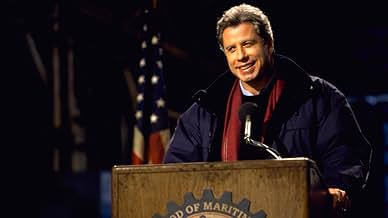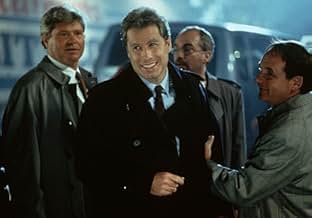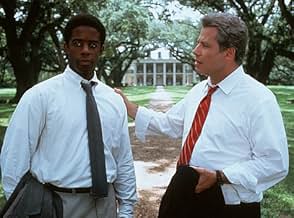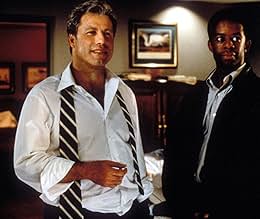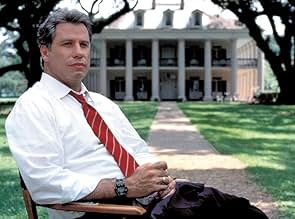CALIFICACIÓN DE IMDb
6.7/10
31 k
TU CALIFICACIÓN
Un hombre se une a la campaña política del candidato a la presidencia de los Estados Unidos.Un hombre se une a la campaña política del candidato a la presidencia de los Estados Unidos.Un hombre se une a la campaña política del candidato a la presidencia de los Estados Unidos.
- Dirección
- Guionistas
- Elenco
- Nominado a 2 premios Óscar
- 10 premios ganados y 31 nominaciones en total
- Dirección
- Guionistas
- Todo el elenco y el equipo
- Producción, taquilla y más en IMDbPro
Opiniones destacadas
This was a truly great commentary on politics in the modern world. John Travolta pulls off one of the best Bill Clinton impressions I've been priveleged enough to witness. Emma Thompson is witty, and real, a true testament to her skill and brilliance in her craft. But my favorite performances were delivered by the supporting characters in the film. To begin, the oft ignored Maura Tierney. She's charming, versatile, talented, and downright adorable. Daisy is horribly underwritten for an actress of her talent, but nevertheless a great and appealing character. Billy Bob Thornton's Richard Jemmons is hilarious and brilliant. He represents the truest example of the hardened believer. Finally came the eloquent and insane Libby Holden given breath in this mortal coil by the infallible Kathy Bates. I couldn't even begin to describe the beauty of this character's idealism. I would love to see more of it in our government. Good movie. Lots of fun, and lots of heart.
"Primary Colors" is about a fictional American politician named Jack Stanton and his attempt to obtain the Democratic Party's nomination for the Presidency. At least, it's ostensibly about a fictional politician. On another level, it is a film a clef about a real American politician named Bill Clinton and his attempt to obtain the Democratic Party's nomination for the Presidency in 1992. The parallels between Clinton and Stanton go much deeper than the deliberate similarity of their surnames. Like Clinton, Stanton is the Governor of a small Southern state. Like Clinton, he has an idealistic streak in his nature and a talent for putting his ideas across in a relaxed, folksy way. (Clinton should have inherited Reagan's title of "The Great Communicator"). And, like Clinton, he also has a talent for getting himself enmeshed in scandal, particularly of a sexual nature.
Other players in the Clinton drama have their equivalents in the film. The Hillary-figure is Stanton's wife Susan, ever supportive and forgiving in public but in private much less ready to pardon her husband's misdemeanours. Stanton's campaign chief Richard Jemmons is presumably based upon James Carville, who fulfilled the same role for Clinton. Stanton's early rival Lawrence Harris parallels Paul Tsongas, who initially led the race for the Democratic nomination but later faded. There is a Gennifer Flowers (or Paula Jones) equivalent in the shape of Cashmere McCarthy, who claims that she had an affair with Stanton.
Although Stanton is, in one sense, the pivotal character (if he were not running for President there would be no film), in another sense the main character is one of his campaign team, Henry Burton, the grandson of a noted black civil rights activist, as the action is seen though his eyes. Henry is an idealistic young man who is caught in two minds about his boss. On the one hand he admires Stanton for his drive and energy and his sincere determination to improve the lot of ordinary people. On the other hand, he is disillusioned with the corruption involved in politics and with the dirty tricks played both against Stanton and on his behalf. The audience are often in two minds about Stanton as well, as he seems to be a fifty-fifty mixture of sincerity and sleaze.
I have never read the novel (originally credited to "Anonymous", but now known to have been written by Joe Klein) on which the film is based, but from what I have heard Stanton was considerably less sympathetic in the book than he appears in the film. (Perhaps traditionally liberal Hollywood did not want to give the Democratic Party too rough a ride). As portrayed by John Travolta, Stanton is in many ways a likable figure, whose flaws are outweighed by his good qualities. Besides his sincere idealism he also shows courage (he tells an audience of unemployed New England shipyard workers that there are no easy answers to their economic problems). In the first half of the film, in particular, it seemed that the film-makers wanted to acquit Stanton (and by implication Clinton) of any serious wrongdoing. Cashmere McCarthy, for example, is exposed as a liar (her surname is presumably borrowed from the notorious Senator who specialised in smearing his opponents) and a supposedly incriminating tape as a fake. Clinton must have wished that the Flowers, Jones and Lewinsky affairs could have been explained away as easily. There is a reference to Whitewater in the shape of the "Freshwater affair", but this is attributed not to Stanton but to one of his opponents.
In the second half of the film, the plot starts to diverge more from real events. Stanton is hit by a second sex scandal, potentially more damaging than any of those Clinton faced, as it involves allegations that he fathered a child by an under-aged girl. In reality, Clinton had a fairly easy ride to the Democratic nomination, but the film-makers obviously wanted to introduce a greater element of drama, as Stanton faces a tough challenge from a late entrant in the race, Fred Picker, the Governor of Florida. (Picker is not based on any actual politician). The climax of the story comes when the Stanton camp discover evidence that Picker, hitherto regarded as scandal-free, has been involved in cocaine-taking and a gay relationship. This presents Stanton and his aides with a moral dilemma; do they use this information to discredit Picker or do they bury it (with the attendant risk that the Republicans might discover it if Picker becomes the Democratic candidate)?
The film is helped by some excellent acting. Travolta is an actor who seems constantly to be re-inventing himself, particularly since "Pulp Fiction" took his career in a new direction, and Stanton is one of his best performances, clearly based upon Clinton but different enough to emerge as a character in his own right. Larry Hagman makes a plausibly charismatic Picker, proving that there is more to him than JR and "I Dream of Jeannie". Special mentions must also go to Emma Thompson's long-suffering Susan, Billy Bob Thornton's Jemmons, a hard-bitten, cynical practitioner of Realpolitik, and, above all, Kathy Bates as Libby, another Stanton aide. Some actresses would have struggled to make Libby- a tough, foul-mouthed lesbian recently released from a mental hospital who at one point threatens to shoot a man in the genitals- anything more than an over-the-top caricature, but Bates manages the difficult task of making her a believable character. Her "Best Supporting Actress" nomination was well deserved.
One reviewer complains that "Travolta does a poor Clinton impression", but despite its obvious relation to real events, "Primary Colors" is more than just a satire on Bill Clinton and his associates. It is a wider satire on American politics in general and a drama that asks some difficult questions about political morality. 7/10
Other players in the Clinton drama have their equivalents in the film. The Hillary-figure is Stanton's wife Susan, ever supportive and forgiving in public but in private much less ready to pardon her husband's misdemeanours. Stanton's campaign chief Richard Jemmons is presumably based upon James Carville, who fulfilled the same role for Clinton. Stanton's early rival Lawrence Harris parallels Paul Tsongas, who initially led the race for the Democratic nomination but later faded. There is a Gennifer Flowers (or Paula Jones) equivalent in the shape of Cashmere McCarthy, who claims that she had an affair with Stanton.
Although Stanton is, in one sense, the pivotal character (if he were not running for President there would be no film), in another sense the main character is one of his campaign team, Henry Burton, the grandson of a noted black civil rights activist, as the action is seen though his eyes. Henry is an idealistic young man who is caught in two minds about his boss. On the one hand he admires Stanton for his drive and energy and his sincere determination to improve the lot of ordinary people. On the other hand, he is disillusioned with the corruption involved in politics and with the dirty tricks played both against Stanton and on his behalf. The audience are often in two minds about Stanton as well, as he seems to be a fifty-fifty mixture of sincerity and sleaze.
I have never read the novel (originally credited to "Anonymous", but now known to have been written by Joe Klein) on which the film is based, but from what I have heard Stanton was considerably less sympathetic in the book than he appears in the film. (Perhaps traditionally liberal Hollywood did not want to give the Democratic Party too rough a ride). As portrayed by John Travolta, Stanton is in many ways a likable figure, whose flaws are outweighed by his good qualities. Besides his sincere idealism he also shows courage (he tells an audience of unemployed New England shipyard workers that there are no easy answers to their economic problems). In the first half of the film, in particular, it seemed that the film-makers wanted to acquit Stanton (and by implication Clinton) of any serious wrongdoing. Cashmere McCarthy, for example, is exposed as a liar (her surname is presumably borrowed from the notorious Senator who specialised in smearing his opponents) and a supposedly incriminating tape as a fake. Clinton must have wished that the Flowers, Jones and Lewinsky affairs could have been explained away as easily. There is a reference to Whitewater in the shape of the "Freshwater affair", but this is attributed not to Stanton but to one of his opponents.
In the second half of the film, the plot starts to diverge more from real events. Stanton is hit by a second sex scandal, potentially more damaging than any of those Clinton faced, as it involves allegations that he fathered a child by an under-aged girl. In reality, Clinton had a fairly easy ride to the Democratic nomination, but the film-makers obviously wanted to introduce a greater element of drama, as Stanton faces a tough challenge from a late entrant in the race, Fred Picker, the Governor of Florida. (Picker is not based on any actual politician). The climax of the story comes when the Stanton camp discover evidence that Picker, hitherto regarded as scandal-free, has been involved in cocaine-taking and a gay relationship. This presents Stanton and his aides with a moral dilemma; do they use this information to discredit Picker or do they bury it (with the attendant risk that the Republicans might discover it if Picker becomes the Democratic candidate)?
The film is helped by some excellent acting. Travolta is an actor who seems constantly to be re-inventing himself, particularly since "Pulp Fiction" took his career in a new direction, and Stanton is one of his best performances, clearly based upon Clinton but different enough to emerge as a character in his own right. Larry Hagman makes a plausibly charismatic Picker, proving that there is more to him than JR and "I Dream of Jeannie". Special mentions must also go to Emma Thompson's long-suffering Susan, Billy Bob Thornton's Jemmons, a hard-bitten, cynical practitioner of Realpolitik, and, above all, Kathy Bates as Libby, another Stanton aide. Some actresses would have struggled to make Libby- a tough, foul-mouthed lesbian recently released from a mental hospital who at one point threatens to shoot a man in the genitals- anything more than an over-the-top caricature, but Bates manages the difficult task of making her a believable character. Her "Best Supporting Actress" nomination was well deserved.
One reviewer complains that "Travolta does a poor Clinton impression", but despite its obvious relation to real events, "Primary Colors" is more than just a satire on Bill Clinton and his associates. It is a wider satire on American politics in general and a drama that asks some difficult questions about political morality. 7/10
Having heard the book was an unbridled attack on Clinton, I was afraid this film would be the same, but it wasn't. "Primary Colors" was definitely better than I thought it would be.
First, there was Elaine May's script: Funny, well-written, lean, tender at moments, never taking things to the camp level, like so many modern Hollywood movies do when it doesn't work. And it wouldn't have worked for this movie. The thing that kept me watching was that, like Henry, I *did* believe in Jack Stanton, or at least I wanted to. The tender moments, like those at the beginning in the literacy class, kind of endeared me to the Stanton character and made me understand how Burton was drawn in so irrevocably.
Then, there was the acting: marvelous. Travolta, Thompson, Bates: need I say more? Thompson's underlying, clipped accent adds a brittle note to her delivery that fits right in with Susan's repression and humiliation. Travolta was just nice enough to make you believe in him (although, in my opinion, he was ultimately unable to fully portray that "je ne sais quoi" that Clinton possesses, which makes him so charming to many). Bates was riveting and harrowing as the faded liberal clinging to her ideals.
But in addition to the "name actors" there were others who were fantastic: Adrian Lester, as the tortured campaign aide, wants to believe but feels unsure of Stanton's worth as a candidate. Maura Tierney (best known as the wife in "Liar Liar") as the bubbling, funny sidekick to Lester (probably based on Dee Dee Myers), lights up every scene she's in. Larry Hagman, in a wonderful cameo, plays Stanton's opponent and his foil in the morals department.
Billy Bob Thornton plays the James Carville role, and I wasn't sure what he added to the film. Since I constantly compared his character unfavorably to James Carville (the Thornton character was shown as a real rotter, sexually harassing aides, etc.), I'm not sure if my dislike of Thornton was more my dislike of his character than that of his acting.
The production of this film also added to its wonderful feel: the Governour's Mansion, the local ribs place, the constant red/white/blue theme (sometimes it seemed like a Kieslowski film), all of it added to the ambiance. I was not surprised to learn that the Michael Ballhaus, the cinematographer, also filmed the sumptuous "Age of Innocence." Quality tells.
Mike Nichols's directing was also effective: in one especially harrowing scene, Emma Thompson's tormented face fills up the foreground, while Bates's character (in the background) rips into the Stantons' morals. I almost felt like I was at the theater.
This film made me think about Clinton as well as politicians in general. What is admirable, what is not acceptable, what is it we really *want* in our public officials? I don't think "Primary Colors" will change anyone's opinion of the Clintons (in the final analysis, it isn't about them at all) -- but it is a very funny as well as thought-provoking look at modern American politics.
First, there was Elaine May's script: Funny, well-written, lean, tender at moments, never taking things to the camp level, like so many modern Hollywood movies do when it doesn't work. And it wouldn't have worked for this movie. The thing that kept me watching was that, like Henry, I *did* believe in Jack Stanton, or at least I wanted to. The tender moments, like those at the beginning in the literacy class, kind of endeared me to the Stanton character and made me understand how Burton was drawn in so irrevocably.
Then, there was the acting: marvelous. Travolta, Thompson, Bates: need I say more? Thompson's underlying, clipped accent adds a brittle note to her delivery that fits right in with Susan's repression and humiliation. Travolta was just nice enough to make you believe in him (although, in my opinion, he was ultimately unable to fully portray that "je ne sais quoi" that Clinton possesses, which makes him so charming to many). Bates was riveting and harrowing as the faded liberal clinging to her ideals.
But in addition to the "name actors" there were others who were fantastic: Adrian Lester, as the tortured campaign aide, wants to believe but feels unsure of Stanton's worth as a candidate. Maura Tierney (best known as the wife in "Liar Liar") as the bubbling, funny sidekick to Lester (probably based on Dee Dee Myers), lights up every scene she's in. Larry Hagman, in a wonderful cameo, plays Stanton's opponent and his foil in the morals department.
Billy Bob Thornton plays the James Carville role, and I wasn't sure what he added to the film. Since I constantly compared his character unfavorably to James Carville (the Thornton character was shown as a real rotter, sexually harassing aides, etc.), I'm not sure if my dislike of Thornton was more my dislike of his character than that of his acting.
The production of this film also added to its wonderful feel: the Governour's Mansion, the local ribs place, the constant red/white/blue theme (sometimes it seemed like a Kieslowski film), all of it added to the ambiance. I was not surprised to learn that the Michael Ballhaus, the cinematographer, also filmed the sumptuous "Age of Innocence." Quality tells.
Mike Nichols's directing was also effective: in one especially harrowing scene, Emma Thompson's tormented face fills up the foreground, while Bates's character (in the background) rips into the Stantons' morals. I almost felt like I was at the theater.
This film made me think about Clinton as well as politicians in general. What is admirable, what is not acceptable, what is it we really *want* in our public officials? I don't think "Primary Colors" will change anyone's opinion of the Clintons (in the final analysis, it isn't about them at all) -- but it is a very funny as well as thought-provoking look at modern American politics.
Primary Colors (1998)
This starts off really great, and gets the flavor of a real campaign, without too much Hollywood hype (campaigns have their own kind of falseness, which is played up here). John Travolta not only hits it just right as a feeling and determined candidate, he also nails Bill Clinton pretty well, too. I don't suppose Emma Thompson is supposed to match Hillary quite as well, but she's a perfect running mate, and throw in Billy Bob (Thornton) as a sidekick and you have a really solid working trio.
But it doesn't quite keep the focus or momentum, or honesty, of the opening scenes. Or humor, sometimes. (This is a comedy, by the way, and director Mike Nichols knows comedy, as does his screenwriter and longtime collaborator, Elaine May. They used to do stand up comedy together in the 1950s!)
What begins as a kind of revelation and interior exploration digresses into more and more clichés of what campaigns do, and what they have to do (sleaze wise) to succeed. We know this stuff. It isn't the facts that enchant us, it's the exceptions to the facts, and it's the nuances between them. It never quite flags, though twenty minutes less screen time sounded good by the end. And Travolta and Thompson hold up their roles consistently.
The real saving grace in the second half is the bursting on the scene of Kathy Bates, who is herself at her best. It might be the best Kathy Bates Kathy Bates has ever done, including some impassioned, tearful stuff. The opposing candidate is remarkably convincing--you even want to vote for him--played by Larry Hagman. On the other hand, the young clerk and campaign manager Adrian Lester is a bit too restrained and dull to make him even noticeable.
Nichols is best when he gets two or three or four people interacting as real people, with flaws and intensity and passion (as in "The Graduate" and "Closer"). And those moments here are terrific, and sometimes hilarious, and make the rest easily worthwhile.
This starts off really great, and gets the flavor of a real campaign, without too much Hollywood hype (campaigns have their own kind of falseness, which is played up here). John Travolta not only hits it just right as a feeling and determined candidate, he also nails Bill Clinton pretty well, too. I don't suppose Emma Thompson is supposed to match Hillary quite as well, but she's a perfect running mate, and throw in Billy Bob (Thornton) as a sidekick and you have a really solid working trio.
But it doesn't quite keep the focus or momentum, or honesty, of the opening scenes. Or humor, sometimes. (This is a comedy, by the way, and director Mike Nichols knows comedy, as does his screenwriter and longtime collaborator, Elaine May. They used to do stand up comedy together in the 1950s!)
What begins as a kind of revelation and interior exploration digresses into more and more clichés of what campaigns do, and what they have to do (sleaze wise) to succeed. We know this stuff. It isn't the facts that enchant us, it's the exceptions to the facts, and it's the nuances between them. It never quite flags, though twenty minutes less screen time sounded good by the end. And Travolta and Thompson hold up their roles consistently.
The real saving grace in the second half is the bursting on the scene of Kathy Bates, who is herself at her best. It might be the best Kathy Bates Kathy Bates has ever done, including some impassioned, tearful stuff. The opposing candidate is remarkably convincing--you even want to vote for him--played by Larry Hagman. On the other hand, the young clerk and campaign manager Adrian Lester is a bit too restrained and dull to make him even noticeable.
Nichols is best when he gets two or three or four people interacting as real people, with flaws and intensity and passion (as in "The Graduate" and "Closer"). And those moments here are terrific, and sometimes hilarious, and make the rest easily worthwhile.
This movie and the book upon which it was based caused a major stir when first released because President Bill Clinton felt the movie was based too much on his own life, even though the author denied that Clinton served as the model for the book's lead character.
It's kind of hard to believe the author, since John Travolta's character has a haircut and a Southern accent identical to Clinton's. Also, the scandals Travolta suffers in the film, such as adulterous affairs and having children out of wedlock, also plagued Clinton during his presidency.
Whoever you believe, Primary Colors is a very enjoyable film, even if you don't like political movies. The entire cast is great, especially Larry Hagman as an aging Florida senator who fills in for one of Travolta's opponents after he has a heart attack. It's a good step away from his J.R. Ewing character, even if his accent sounds the same.
Primary Colors is rated R for profanity and sexual references, but I think a PG-13 would have been more appropriate.
Krispy Kreme dougnuts, anyone?
It's kind of hard to believe the author, since John Travolta's character has a haircut and a Southern accent identical to Clinton's. Also, the scandals Travolta suffers in the film, such as adulterous affairs and having children out of wedlock, also plagued Clinton during his presidency.
Whoever you believe, Primary Colors is a very enjoyable film, even if you don't like political movies. The entire cast is great, especially Larry Hagman as an aging Florida senator who fills in for one of Travolta's opponents after he has a heart attack. It's a good step away from his J.R. Ewing character, even if his accent sounds the same.
Primary Colors is rated R for profanity and sexual references, but I think a PG-13 would have been more appropriate.
Krispy Kreme dougnuts, anyone?
¿Sabías que…?
- TriviaThen-President Bill Clinton enjoyed this movie so much that he even invited John Travolta to a party, on one condition, he must come as Governor Jack Stanton. Travolta declined.
- ErroresWhen watching the New Hampshire returns, one TV station says that Governor Stanton is still out campaigning on the street until the polls close while the other simultaneously says 15 percent of the vote has already been counted. Votes aren't counted until after the polls close.
- Citas
[with a gun in her enemy's crotch]
Libby Holden: I am a gay lesbian woman! I do not mythologize the male sexual organ!
- ConexionesEdited from Air Bud (1997)
- Bandas sonorasPrimrose Lane
Written by Wayne Shanklin and George 'Red' Callender (as George Callender)
Selecciones populares
Inicia sesión para calificar y agrega a la lista de videos para obtener recomendaciones personalizadas
- How long is Primary Colors?Con tecnología de Alexa
Detalles
- Fecha de lanzamiento
- Países de origen
- Sitio oficial
- Idiomas
- También se conoce como
- El escándalo
- Locaciones de filmación
- Productoras
- Ver más créditos de la compañía en IMDbPro
Taquilla
- Presupuesto
- USD 65,000,000 (estimado)
- Total en EE. UU. y Canadá
- USD 39,001,187
- Fin de semana de estreno en EE. UU. y Canadá
- USD 12,045,395
- 22 mar 1998
- Total a nivel mundial
- USD 52,090,187
- Tiempo de ejecución2 horas 23 minutos
- Color
- Mezcla de sonido
- Relación de aspecto
- 2.35 : 1
Contribuir a esta página
Sugiere una edición o agrega el contenido que falta


